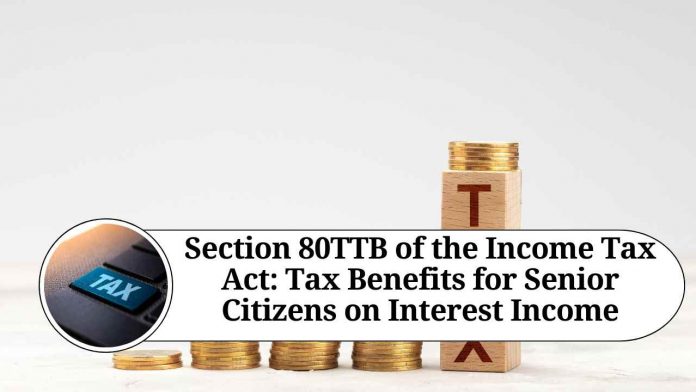Introduction
Section 80TTB of the Income Tax Act, introduced in the Union Budget 2018, aims to provide tax benefits to senior citizens in India on their interest income. As individuals reach their golden years and rely on their savings and investments, this section offers them relief by allowing deductions on interest earned from specified sources. In this blog, we will delve into the details of Section 80TTB and explore its provisions, eligibility criteria, and benefits for senior citizens.
Eligibility Criteria
To avail the benefits under Section 80TTB, individuals must meet the following eligibility criteria:
- Age: Only senior citizens aged 60 years or above are eligible for this deduction. However, the category extends to super senior citizens aged 80 years or above, allowing them to claim additional benefits.
- Residential status: The individual should be a resident of India as per the provisions of the Income Tax Act.
Key Features and Provisions
- Applicable sources of interest income: Section 80TTB covers interest income earned from specified sources, including savings accounts, fixed deposits (FDs), recurring deposits (RDs), and deposits in co-operative societies engaged in banking business. It is important to note that interest earned on securities or bonds is not covered under this section.
- Maximum deduction limit: The maximum deduction allowed under Section 80TTB is Rs. 50,000 per financial year. For super senior citizens, an additional deduction of up to Rs. 50,000 is available, bringing the total deduction limit to Rs. 1 lakh.
- Non-applicability for other deductions: It’s important to note that if a senior citizen opts for the deduction under Section 80TTB, they will not be eligible for any other deduction under Section 80TTA, which provides a deduction of up to Rs. 10,000 on interest earned from savings accounts.
Benefits of Section 80TTB
- Reduced tax liability: Section 80TTB provides senior citizens with the opportunity to reduce their tax liability by deducting a significant portion of their interest income. This can be particularly beneficial for individuals who rely on interest income for their day-to-day expenses.
- Enhanced financial stability: The tax benefits offered by Section 80TTB provide senior citizens with added financial stability and a higher disposable income, enabling them to meet their expenses and maintain a comfortable lifestyle during their retirement years.
- Encouragement for savings and investment: By offering tax incentives on interest income, Section 80TTB encourages senior citizens to save and invest in fixed deposits and other specified instruments. This can contribute to the overall growth of the economy by increasing the flow of funds into these instruments.
Conclusion
Section 80TTB of the Income Tax Act plays a crucial role in providing tax relief to senior citizens and promoting their financial well-being during their retirement years. By allowing deductions on interest income from specified sources, this section eases the tax burden on individuals who primarily rely on their savings and investments for income. It is advisable for senior citizens to consult with a tax advisor or chartered accountant to understand the intricacies of this provision and ensure they make the most of the benefits offered under Section 80TTB.
Other Related Blogs: Section 144B Income Tax Act
Frequently Asked Questions (FAQs)
Q.What is Section 80TTB?
Section 80TTB is a provision in the Income Tax Act that provides tax benefits to senior citizens on their interest income from specified sources.
Q.Who is eligible to avail of the benefits under Section 80TTB?
Individuals who are 60 years or above (senior citizens) and residents of India are eligible for the benefits under Section 80TTB. Super senior citizens aged 80 years or above can claim additional benefits.
Q.What are the specified sources of interest income covered under Section 80TTB?
Section 80TTB covers interest income from savings accounts, fixed deposits (FDs), recurring deposits (RDs), and deposits in co-operative societies engaged in banking business.
Q.Are interest earnings from securities or bonds eligible for deduction under Section 80TTB?
No, interest earnings from securities or bonds are not eligible for deduction under Section 80TTB. This provision specifically covers interest income from specified sources mentioned above.
Q.What is the maximum deduction limit under Section 80TTB?
The maximum deduction limit under Section 80TTB is Rs. 50,000 per financial year for senior citizens. However, super senior citizens can claim an additional deduction of up to Rs. 50,000, bringing the total deduction limit to Rs. 1 lakh.
Q.Can a senior citizen claim deductions under both Section 80TTB and Section 80TTA?
No, a senior citizen who claims deductions under Section 80TTB is not eligible to claim any other deduction under Section 80TTA, which provides a deduction of up to Rs. 10,000 on interest earned from savings accounts.
Q.Is there any age limit for claiming the additional deduction available to super senior citizens?
No, there is no upper age limit for claiming the additional deduction available to super senior citizens. As long as they meet the age criterion of being 80 years or above, they can claim the extra deduction.
Q.Can a non-resident senior citizen claim benefits under Section 80TTB?
No, only resident senior citizens are eligible to claim benefits under Section 80TTB. Non-resident senior citizens are not covered under this provision.
Q.Is the deduction under Section 80TTB available for interest earned from all types of bank accounts?
Yes, the deduction under Section 80TTB is available for interest earned from savings accounts, fixed deposits (FDs), recurring deposits (RDs), and deposits in co-operative societies engaged in banking business.
Q.Do I need to submit any supporting documents to claim the deduction under Section 80TTB?
As of now, no specific supporting documents are required to claim the deduction under Section 80TTB. However, it is advisable to maintain proper records of interest income from specified sources in case of any future scrutiny by the income tax authorities.




















